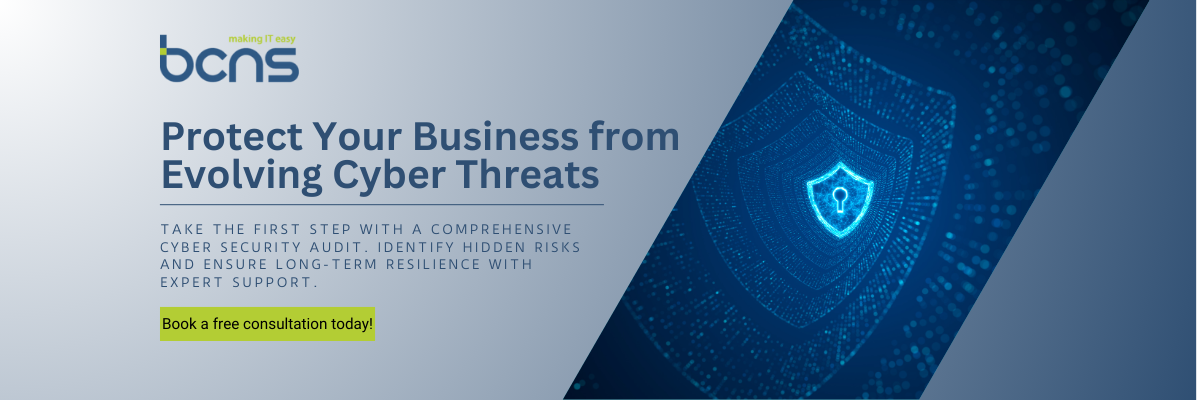When was the last time you conducted a cyber security audit? Cyber threats are an issue for every business, especially those handling sensitive client data or relying on digital systems to stay productive; keeping protected has never been more crucial. This is where cyber security audits come in to offer Exeter businesses a proactive way to assess risk, strengthen defences, and ultimately avoid costly disruptions.
What Is a Cyber Security Audit – And Why Do I Need One?
A cyber security audit is a structured evaluation of your organisation’s digital infrastructure. It assesses policies, procedures, and tools to identify any gaps or vulnerabilities that could be exploited by attackers. In essence, it’s a health check for your IT systems that helps you understand whether your business is truly secure.
With the mounting pressure on businesses to prevent cyber-attacks, especially as they continue to utilise advanced technologies to become more malicious, it’s never been more important to invest in your business’s cyber security protocols. The government’s Cyber Security Breaches Survey 2025 reports that only 29% of businesses conduct cyber security risk assessments, highlighting the need for more businesses to take proactive assessment measures to power strategic cyber security practices and decrease the likelihood of experiencing an attack.
Overall, for businesses in Exeter, a cyber security audit provides clarity and confidence, helping you meet both regulatory obligations and customer expectations.
How Audits Help Exeter Businesses Stay Ahead of Threats
As cyber threats evolve, businesses that wait for something to go wrong are often the ones hit hardest. Helping you avoid this, regular cyber security audits give Exeter businesses a strategic advantage by identifying risks early and reinforcing security throughout every area. Let’s explore how a thorough audit can make a difference:
- Pinpointing System Vulnerabilities
An audit will review your hardware, software, and network infrastructure to identify any weak points that can be exploited by attackers. This includes searching for unpatched software, insecure configurations, unsupported systems, and outdated antivirus tools. Identifying these risks means your business can prioritise updates and mitigate threats before they’re exploited. - Assessing Internal Policies and Staff Awareness
One of the most common ways for a cyber incident to occur is from human error. Countering this, audits assess your internal security policies, like password management, access controls, and incident response procedures. This enables you to evaluate how well your staff understand and follow protocols. From this, recommendations may include improved training or policy adjustments to better align with your practices. - Testing Regulatory and Standards Compliance
Whether you’re working toward Cyber Essentials (which this article reveals only 14% of businesses are aware of), ISO 27001, or simply trying to meet sector-specific regulations, audits check whether your current systems and processes meet necessary standards. This works to strengthen your cyber security posture and reduces the risk of fines or reputational damage from non-compliance. - Reviewing Threat Monitoring Capabilities
Being able to detect a breach in real-time is crucial in saving your business from major financial and operational fallout. With a cyber security audit, the tools and processes you have in place for real-time threat monitoring, intrusion detection, and alert management are examined to highlight any gaps that could delay your response. - Evaluating Endpoint Protection
Many Exeter businesses now operate in a hybrid or remote environment. Therefore, ensuring every device – like laptops and smartphones – is secure is vital. An audit evaluates whether your endpoint protection software is properly configured, up-to-date, and offering adequate protection against current threats like ransomware and phishing attacks. - Providing a Roadmap for Future Improvements
A high-quality audit delivers clear, actionable recommendations tailored to your business. This could include upgrading certain tools, adopting multi-factor authentication, or tightening access privileges. It should also give you a roadmap for continuous improvement, helping your organisation build stronger resilience over time.
BCNS’s Proactive Approach to Cyber Security Audits
At BCNS, we strive to help Exeter businesses effectively prevent issues. That’s why our cyber security audits are designed to be both comprehensive and bespoke to your business. Our audits deliver actionable insights that help you prioritise fixes, implement better processes, and ensure your cyber security measures are future-proof.
Additionally, our audits assess your systems using robust industry-recognised tools and frameworks. We use:
- Cyber Essentials certification tools to benchmark your business against UK government security standards.
- Advanced vulnerability assessment tools to uncover hidden risks across networks, servers, and applications.
- Threat monitoring platforms to ensure real-time visibility and rapid incident detection.
- Endpoint protection software to safeguard every device – whether in the office or remote.
Book a Free Consultation Today
Cyber security audits are a necessity for Exeter businesses looking to remain secure and resilient against cyber threats now and in the future. Our audits help uncover vulnerabilities, improve compliance, and build stronger cyber defences. With BCNS’s expert guidance and cutting-edge tools, you can feel confident your business is protected from evolving threats.
Book your free cyber security consultation with us today.





